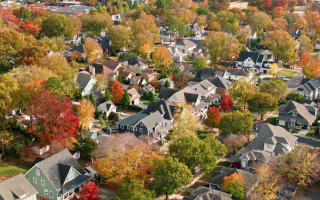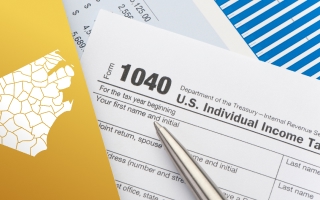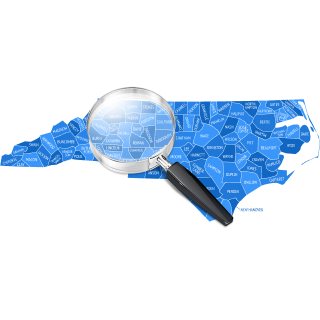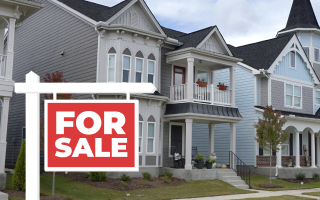Property Tax Records in North Carolina

If you buy a home in North Carolina, you'll owe property taxes that must be paid once every year. These taxes are assessed by the county and city you live in to cover some of the expenses in their annual budgets. The average property tax rate throughout North Carolina is 0.70%. The national average is 0.99%, which means that North Carolina residents benefit from lower-than-normal property taxes. Coupled with lower real estate prices in general, North Carolina can be a great place to buy a house.
The property tax in North Carolina is "ad valorem", which indicates that your taxes are based on the total value of your property. While state law requires properties to be assessed once every eight years, some assessors perform mass appraisals more often.
In most North Carolina counties, property tax bills are sent out annually during July. You'll be tasked with paying this bill by September 1. Many homeowners choose to include property taxes in their monthly mortgage payments. Since North Carolina property taxes are low, this might only add a couple hundred dollars to your monthly payments.
Property taxes have been levied in North Carolina since colonial times. At first, properties were taxed by quantity instead of value. It wasn't until 1868 that property tax laws were altered to ensure that taxation was based on value. Counties have had direct control over property taxes since 1921.
Property Tax Assessment in North Carolina

The property tax bill you receive every year is based on your county's current tax rate and the market value of your home. The tax rate is applied to your home's assessed value, which isn't always the same as the market value. The market value represents the amount you could earn from listing your home and selling it to a buyer. In comparison, the assessed value is the amount of your home's market value that can be taxed.
In some states, the assessment value is around 50% of the market value. North Carolina assesses properties at 100% of the market value. If your home's market value is $300,000, this will likely be its assessed value as well. Keep in mind that historic properties are assessed at 50% of the true value.
Property taxes are determined based on taxes that are levied by counties, cities, and special tax districts. For example, property taxes might be collected for fire protection. However, the state government doesn't collect property taxes, which is the main reason why the effective tax rate is so low.
While the assessed value of a home is usually 100% of the market value, your county's tax assessor may not reappraise your home for eight years. In this scenario, the market value of your property could increase significantly even though the assessment value remains the same.
To calculate your property taxes, multiply your county's effective tax rate by the value of your home. If you have a $300,000 home and live in a county with an effective tax rate of 0.76%, your annual property taxes will amount to $2,280. If you qualify for any property tax exemptions, you may be able to reduce the amount of taxes you pay every year. The average tax rates for the most populous North Carolina counties are:
- Wake County: 0.96%
- Mecklenburg County: 1.03%
- Guilford County: 1.04%
- Forsyth County: 1.10%
- Cumberland County: 1.20%
Surprisingly, property taxes in Wake County are lower than in other counties, though not by a lot.
Calculate North Carolina Taxes
A North Carolina property tax calculator is a helpful tool for homeowners and real estate investors looking to better understand how property taxes are calculated across the state. It allows users to enter important property details, such as location, market value, and property use, to estimate annual tax assessments and liabilities based on county-specific tax rates and assessment practices.
This calculator can also help identify available property tax exemptions and relief programs that may apply to your situation. North Carolina offers several programs, including the Elderly or Disabled Exclusion, which excludes the greater of $25,000 or 50% of a home’s appraised value for qualifying homeowners, and the Disabled Veteran Exclusion, which exempts up to $45,000 of a home’s value from taxation. The calculator is a practical resource for estimating savings and understanding how exemptions might reduce your annual property tax bill.
using our property tax calculator.
North Carolina Property Tax Records: What Are They?

Property tax is the largest revenue source for most county governments in North Carolina. These funds are often used to pay for a wide range of goods and services throughout the county. Counties set their tax rates based on their annual budgets. In most cases, property tax revenues will be used to pay for the following:
-
Public schools
-
Libraries
-
Fire departments
-
Police departments
-
Parks
-
Recreational facilities
If you are thinking of buying a home and want to know how much you'll end up paying in property taxes, consider searching for tax records. In North Carolina, county governments provide these records to the public for free.
You can access them through an online database that allows you to search for homes if you have an address, parcel ID, or name that's related to the property. If you only have a partial address, you'll receive a list of properties that might be relevant to your search.
Most county databases provide a combination of real estate records and tax records. You can learn more about tax payments as well as details about the home with a single search. In Wake County, you can search with parameters like real estate ID, parcel ID, location address, and owner name. The information you'll receive after a successful search includes property owner names and also the following:
-
Land class
-
Fire district
-
Zoning
-
Acreage
-
Property address
-
Previous sale date and price
-
Square footage
-
Assessed value and market value
-
Building details, such as the number of rooms and architectural style
-
Building sketch
-
Photograph
-
Description of land
-
Renovations
-
Previous sales
-
Tax bills and payment dates
Property Tax Exemptions and Deductions in North Carolina

North Carolina provides property owners with several tax relief programs. If you qualify for one of these programs, you may be able to reduce your home's assessed value, which means that your annual property taxes will drop as well. Keep in mind that every exemption has requirements that you'll need to meet to qualify.
Elderly or Disabled Homestead Exemption: If you're a senior adult or disabled individual, you might qualify for a property tax exemption. This exemption can amount to either 50% of your home's taxable value or $25,000, whichever is higher. Disabled individuals must have a medical professional fill out and submit Form AV-9A Disability Certification
You must be a North Carolina resident and a homeowner to qualify. If you're at least 65 years old or disabled, you can claim this exemption. Even if you have a partial disability, you might qualify for the exemption if the disability is permanent and keeps you from being gainfully employed. However, your income can't exceed $36,700.
Disabled Veteran Homestead Exclusion: There aren't any income or age requirements for this specific exemption program. It's available to veterans as well as surviving spouses. The exemption amount is equal to $45,000. Make sure you provide documentation of your service-connected disability from the Department of Veterans Affairs.
Elderly or Disabled Property Tax Deferral: This program allows people who qualify to defer some of their property taxes. If you earn $36,700 or less during the year, the amount of property taxes that are higher than 4% of your income can be deferred.
If your annual income is between $36,700 and $55,050, you'll be able to defer the property taxes that are more than 5% of your annual income. You need to own the residence for at least five years to qualify. This exemption is available to people who are at least 65 years old. It can also be claimed by homeowners with a permanent or total disability.
How To Search Property Tax Records in North Carolina

If you're looking for property tax records in North Carolina, you can find them by accessing your county's free online database or by using a platform like PropertyChecker. Not every county offers the same database. Some counties have rudimentary ones that may provide limited functionality, which means that they could be difficult to navigate.
If you use PropertyChecker, you can look for tax records with information like the property address or the owner's name. You can even search for records with the owner's email address or phone number. The deed and property records you'll receive should include the following data:
-
Previous sales
-
Loan records
-
Lien records
-
Assessed and market values
-
Owner names
-
Deed details, such as the terms of a sale
-
Neighborhood information
-
Property details
-
Building permits
-
Property tax records
-
Foreclosures
How To Appeal Property Taxes in North Carolina

In most states, property values are calculated by county assessors every two to four years. North Carolina assessors are only required to revalue properties every eight years. If your Notice of Assessment is higher than it should be, you might be stuck with paying elevated property taxes for years.
You can avoid this issue altogether by appealing a Notice of Assessment that improperly values your home. There are numerous mistakes that an assessor can make. They might write down the wrong square footage or incorrectly indicate that you've renovated your home. If these details aren't true, the reassessed value of your home might be inaccurate. In this situation, consider appealing your property taxes.
Step 1: Once the county assessor reappraises your home, you should receive a Notice of Assessment. If you believe that your home's assessed value is inaccurate, consider calling your county assessor to see if the assessment can be appealed informally.
Step 2: If the county assessor doesn't overturn their decision, you can appeal to the Board of Equalization. They usually hold hearings on property tax appeals in April.
Once the hearing occurs, you may receive a decision immediately. However, the Board can also delay for further deliberation. You'll get a letter that details the Board's decision in the mail.
Step 3: If you aren't satisfied with the local Board's decision, you can appeal to the Property Tax Commission. This commission meets every month in Raleigh. Keep in mind that this appeal is handled like a trial court. You'll have the burden of proof, which means that you must submit evidence that backs up your claim. Consider hiring an attorney for this stage of the process.
Step 4: You can also appeal the Property Tax Commission's decision to the state Supreme Court or the Court of Appeals. However, they typically don't take up these cases, so you're certainly faced with an uphill battle if you want to appeal North Carolina Property taxes.
How Property Tax Records Impact Real Estate Transactions in North Carolina

No matter the county or tax rate, property taxes often have an impact on real estate transactions. Let's say that a home is being sold in a county with a 0.76% tax rate. If the home is listed at $300,000, the annual property taxes will be close to $2,300. Since most homeowners fold their property taxes into their mortgage payments, their monthly expenditures can increase by nearly $200.
Buyers may be more hesitant to purchase homes in areas with high tax rates. While most counties in North Carolina have tax rates below 1%, there are nearly two dozen counties where the rate is higher than 1%. In counties with higher tax rates, sellers might need to price their homes competitively to cultivate more interest from potential buyers.
Property taxes are relevant to investors as well. An investor needs to earn more income from a property than what they pay every month. If property taxes add $200-$300 to monthly mortgage payments, the rent needs to be high enough to offset these costs.
Investors in North Carolina are often involved in property tax sales. These sales occur if homeowners don't pay their annual taxes on time. Keep in mind that annual property taxes will become delinquent if they aren't paid by January 5 of the following year. As mentioned before, they're due by September 1.
Once property taxes become delinquent, the county will place a lien on the home. This lien allows the county to claim unpaid taxes if the property is sold. The county will also be able to begin the foreclosure process. The owner will usually receive a notice before the foreclosure takes place, which gives them some time to pay their taxes.
The owner can reclaim their property even after the foreclosure process is set in motion. The property will be taken through a public tax sale, which means that investors can bid on it. The investor who makes the winning bid will gain ownership of the home.
Free North Carolina Property Tax Lookup
Tax Records Please wait...
Property Tax Guide
- Property Tax Records in North Carolina
- Property Tax Assessment in North Carolina
- North Carolina Property Tax Records: What Are They?
- Property Tax Exemptions and Deductions in North Carolina
- How To Search Property Tax Records in North Carolina
- How To Appeal Property Taxes in North Carolina
- How Property Tax Records Impact Real Estate Transactions in North Carolina
Instant Access to North Carolina Property Records
- Owner(s)
- Deed Records
- Loans & Liens
- Values
- Taxes
- Building Permits
- Purchase History
- Property Details
- And More!
Free North Carolina Property Tax Lookup
Tax Records Please wait...
Property Tax Guide
- Property Tax Records in North Carolina
- Property Tax Assessment in North Carolina
- North Carolina Property Tax Records: What Are They?
- Property Tax Exemptions and Deductions in North Carolina
- How To Search Property Tax Records in North Carolina
- How To Appeal Property Taxes in North Carolina
- How Property Tax Records Impact Real Estate Transactions in North Carolina